Tom's Hardware Verdict
Out of the box, the Ryzen 7 3800X offers a better mixture of single- and multi-threaded performance than Intel's competing chips, and support for the PCIe 4.0 interface unlocks the potential of ultimate storage throughput. The impressive power efficiency and performance make for a compelling upgrade, but value-seekers who aren't afraid of minimal tuning should look to the less-expensive Ryzen 7 3700X for similar performance.
Pros
- +
Solid blend of single- and multi-threaded performance
- +
PCIe 4.0 support
- +
Unlocked multiplier
- +
X470 compatibility
- +
Bundled cooler
Cons
- -
Requires expensive X570 motherboard for PCIe 4.0
- -
Extremely limited manual and auto-overclocking headroom
Why you can trust Tom's Hardware
Cranking it up to 105W
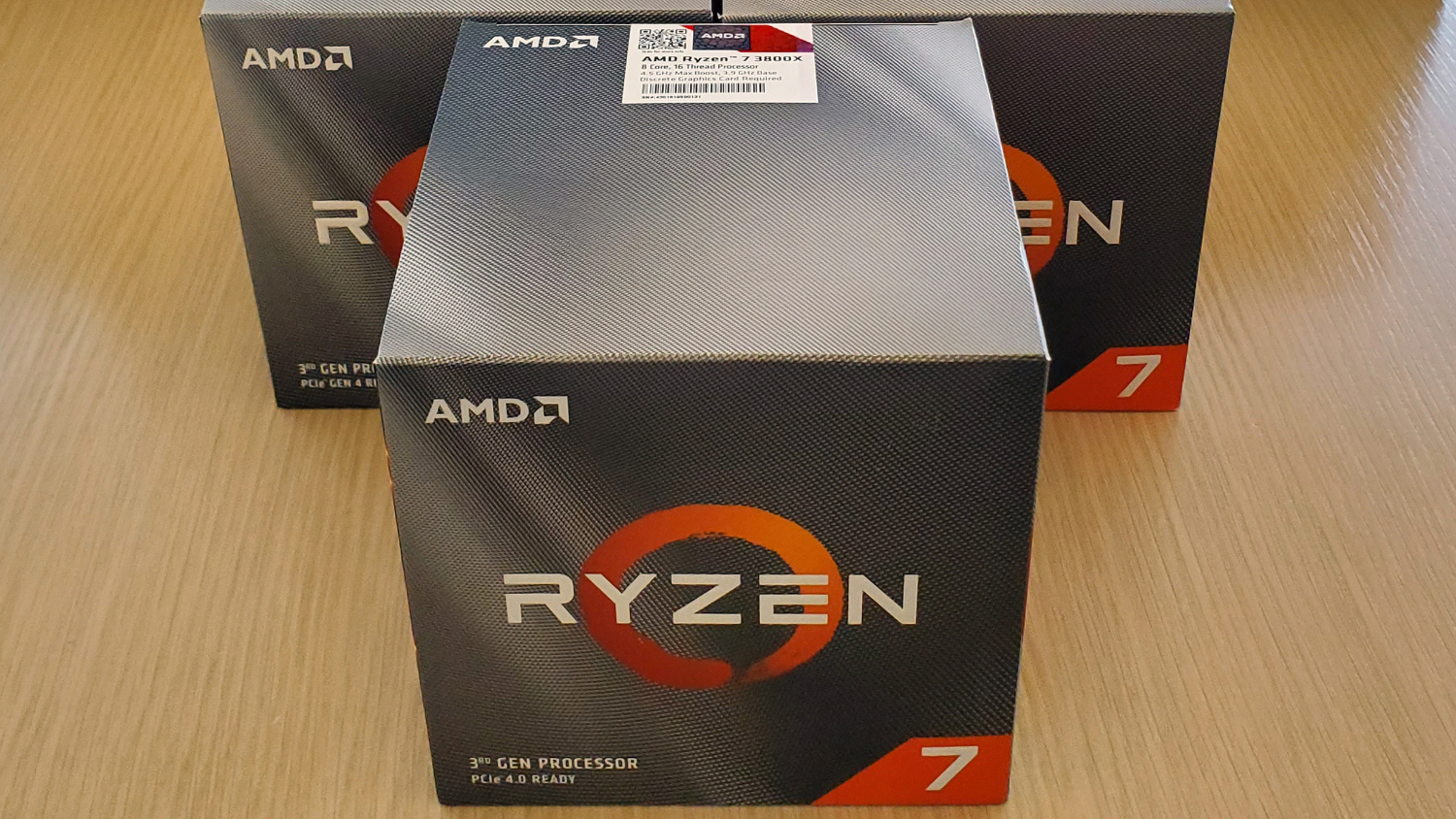
AMD's Ryzen 3000 series has landed, upping the ante with Intel in its high-stakes game for desktop PC market dominance with a well-rounded lineup of new chips that push mainstream platforms to higher core counts and more raw compute than we've ever seen. As a result, Intel's commanding presence in the enthusiast space is threatened in a way we haven't seen in over a decade.
We began with a look at the Ryzen 9 3900X and Ryzen 7 3700X last week and came away impressed, but our review left us feeling like something was missing.
That something is the Ryzen 7 3800X. AMD cranks the TDP dial up to 105W on this 8-core 16-thread chip, making it the high-performance counterpart to the 65W Ryzen 7 3700X, which is basically the same 7nm chip built with the Zen 2 microarchitecture, but with a lower TDP rating. That chip came away from our first look at the Ryzen 3000 series with an Editor's Choice award, going toe-to-toe with Intel's Core i7-9700K, so it's fair to say we have high hopes for the higher-performance model. AMD still hasn't sampled the chip to the press, so we bought one at retail to put it under the microscope.
The Ryzen 7 3800X slots in beneath the Ryzen 9 3900X, which comes with two 7nm compute die tied together with a 12nm I/O die to yield a 12-core 24-thread part. AMD has worked wonders to reduce the impact of this sort of multi-chip arrangement, but it's fair to assume that the Ryzen 7 3800X's single-compute-die design, paired with a higher TDP rating that facilitates more aggressive boost clocks, could actually rival the 3900X in some applications – games included.
| Row 0 - Cell 0 | SEP (USD) | Cores / Threads | TDP (Watts) | Base / Boost Frequency (GHz) | L3 Cache (MB) | PCIe 4.0 Lanes |
| Ryzen 9 3950X | $749 | 16 / 32 | 105W | 3.5 / 4.7 | 64 | 24 |
| Ryzen 9 3900X | $499 | 12 / 24 | 105W | 3.8 / 4.6 | 64 | 24 |
| Ryzen 7 3800X | $399 | 8 / 16 | 105W | 3.9 / 4.5 | 32 | 24 |
| Ryzen 7 3700X | $329 | 8 / 16 | 65W | 3.6 / 4.4 | 32 | 24 |
| Ryzen 5 3600X | $249 | 6 / 12 | 95W | 3.8 / 4.4 | 32 | 24 |
| Ryzen 5 3600 | $199 | 6 / 12 | 65W | 3.6 / 4.2 | 32 | 24 |
And that's exactly what we've found. The Ryzen 7 3800X takes the basic ingredients of the Zen 2 microarchitecture, which brings an average of 15% more instructions per cycle (IPC) throughput, and 7nm process and melds them into a high-performance chip that is impressive across our test suite, especially when we factor in the competitive pricing, PCIe 4.0 interface, backward compatibility with most AM4 socket motherboards, unlocked overclocking features, and bundled cooler.
But we've also found that, after simple push-button overclocking, the Ryzen 7 3700X offers similar performance to the 3800X, even when it is also overclocked. But for $70 less. The Ryzen 7 3800X is an impressive chip and offers a better mixture of performance than Intel's Core i7-9700K, no doubt, but in this case, value seekers might opt for its less expensive sibling.
Ryzen 7 3800X
We covered the deep dive details of the Ryzen 3000 chip design in our AMD Ryzen 9 3900X and Ryzen 7 3700X review, so head there for more information on the 3800X's architecture, which is identical to the Ryzen 7 3700X.
Get Tom's Hardware's best news and in-depth reviews, straight to your inbox.
The $399 Ryzen 7 3800X lands in the pricing gap between the $488 Core i9-9900K and the $374 Core i7-9700K. Of course, the -9700K slots in as the 3800X's natural competitor, and while it matches the AMD part with eight physical cores, Intel's trimming of the Hyper-Threading feature leaves it eight threads shy of the 3800X.
| Row 0 - Cell 0 | Process | SEP / RCP (USD) | Cores / Threads | TDP (Watts) | Base Frequency (GHz) | Total Cache (MB) | PCIe Lanes | iGPU | Price Per Thread |
| Core i9-9900K | 14nm | $488 | 8 / 16 | 95w | 3.6 / 5.0 | 16 | 16 Gen3 | Yes | $30.05 |
| Ryzen 7 3800X | 7nm | $399 | 8 / 16 | 105W | 3.9 / 4.5 | 32 | 24 Gen4 | No | $24.94 |
| Core i9-9700K | 14nm | $374 | 8 / 8 | 95W | 3.6 / 4.9 | 12 | 16 Gen3 | Yes | $46.75 |
| Ryzen 7 2700X | 12nm | $329 | 8 / 16 | 105W | 3.7 / 4.3 | 16 | 20 Gen3 | No | $20.56 |
| Ryzen 7 3700X | 7nm | $329 | 8 / 16 | 65W | 3.6 / 4.4 | 32 | 24 Gen4 | No | $20.56 |
| Core i7-9700 | 14nm | $323 | 8 / 8 | 95W | 3.6 / 4.9 | 12 | 16 Gen3 | Yes | $40.38 |
The -9700K comes with a 95W TDP rating, whereas the 3800X weighs in with a 105W rating. Contrary to popular belief, these ratings aren't meant to quantify power consumption. Instead, they measure the amount of heat the chip dissipates under load, but both companies use different test methodologies. Intel specs TDP at the base frequency, thus ignoring peak heat output during boost activity, while AMD measures with all cores fully loaded. The only way to make real power comparisons is via power measurement, which we'll get to shortly. In either case, we expect that AMD's 7nm design will continue the trend of heightened power efficiency over Intel's 14nm parts. The 3800X also comes with a healthy serving of 32MB of L3 cache, while Intel's -9700K comes with 12MB.
As the higher-priced version of the Ryzen 7 3700X, the 3800X has higher base and Precision Boost frequencies of 3.9 and 4.5 GHz, respectively. That's a 300 MHz increase in base frequency and a 100 MHz bump to boost clocks, but the real advantage should lay in the higher Package Power Tracking (PPT) envelope, which is a measurement of the maximum amount of power delivered to the socket. The 3700X's PPT tops out at 88W, while the motherboard can pump up to 142W to the 3800X at peak performance. That opens up much more aggressive boost behavior, on both single and multiple cores, that could widen the performance gap beyond what we see on the spec sheet.
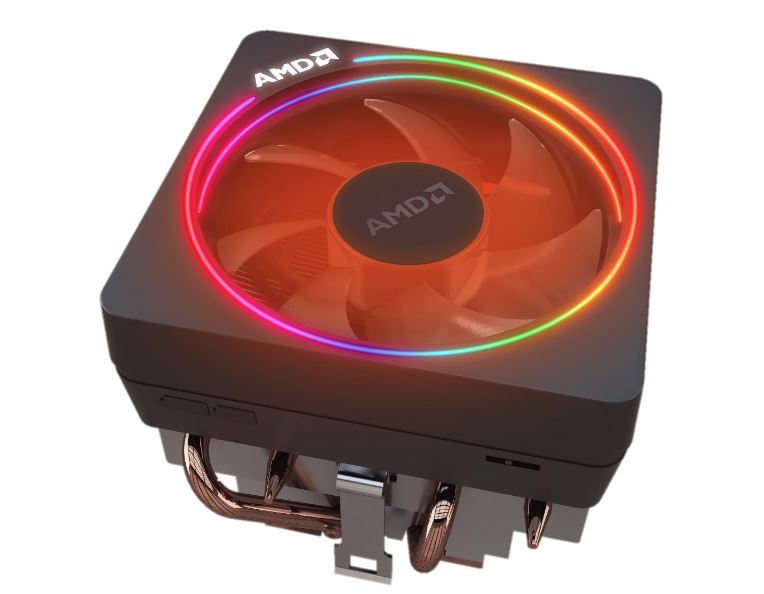
Like the other Ryzen 7 and 9 chips, the 3800X comes with the capable Wraith Prism RGB cooler which is rated to dissipate up to 124W if you crank the fans up to high. Given the 3800X's maximum 142W PPT measurement, that means, at least on paper, that the Wraith Prism might come up a tad shy of dissipating the full heat output of the 3800X at stock settings.
Due to the dynamic nature of AMD's Precision Boost 2 algorithms, the chip will react based upon its environmental conditions, with thermal dissipation being a key variable that dictates performance. That means you could likely get better performance, even at stock settings, with a better cooler. The Wraith also won't provide much overclocking headroom. Consider buying a heftier cooler for overclocking or unleashing the full benefit of Precision Boost Overdrive (AMD's automated overclocking feature). We've flagged this for additional testing once we receive more mature BIOS revisions.
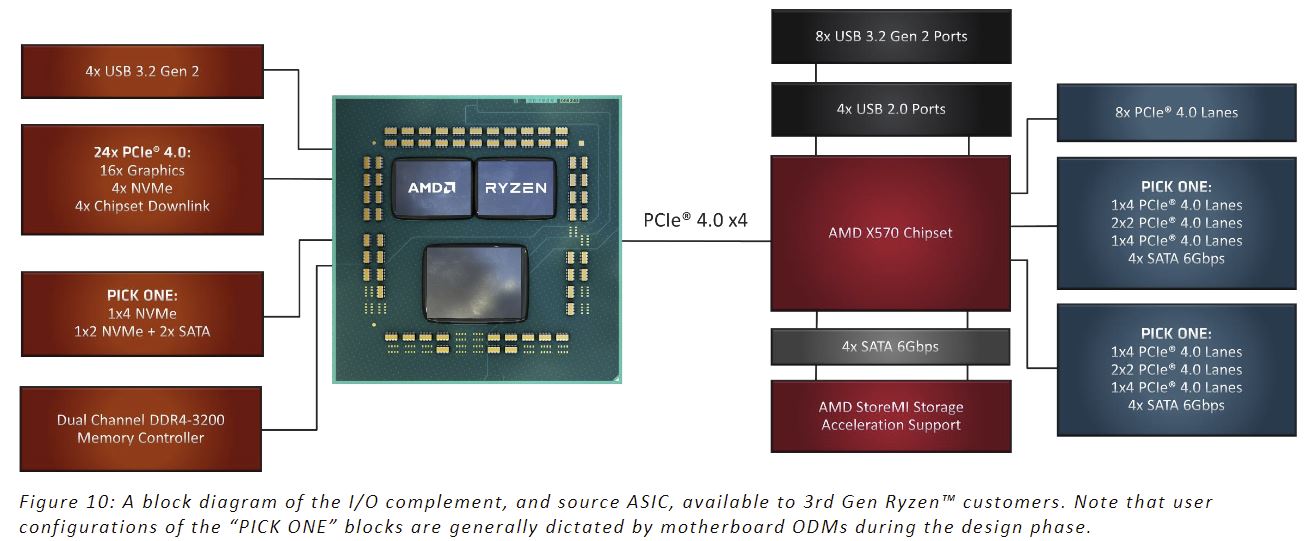
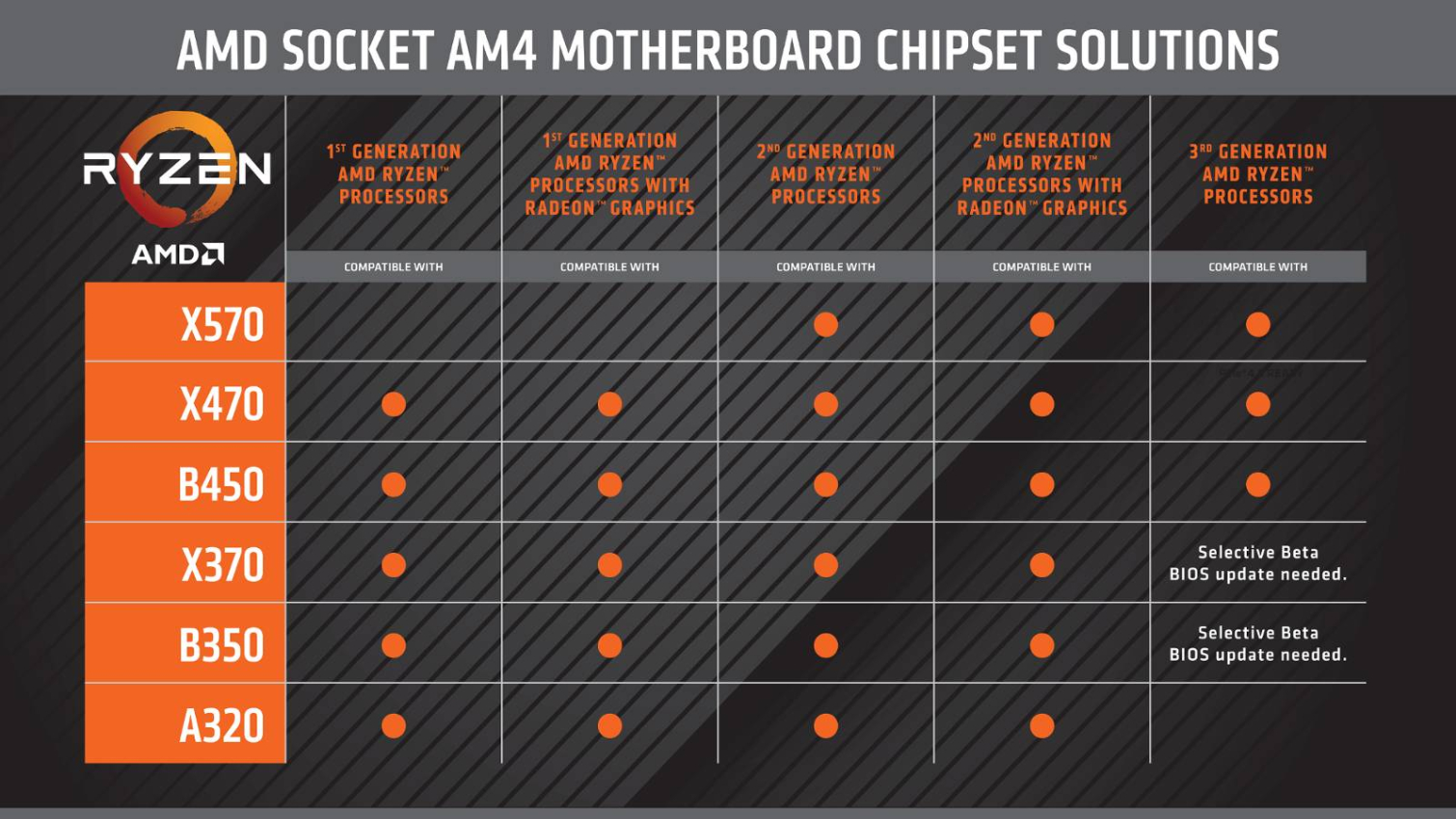
You can pair the Ryzen 3000 chips with the new X570 chipset to unleash the increased throughput of PCIe 4.0, a feature that Intel doesn't offer, or you can drop the processor into most previous-gen motherboards as a value alternative, but you'll lose PCIe 4.0 support.
| DIMM Config | Memory Ranks | Official Supported Transfer Rate (MT/s) |
| 2 of 2 | Single | DDR4-3200 |
| 2 of 4 | DDR4-3200 | |
| 4 of 4 | DDR4-2933 | |
| 2 of 2 | Dual | DDR4-3200 |
| 2 of 4 | DDR4-3200 | |
| 4 of 4 | DDR4-2667 |
Ryzen 3000 chips support dual-channel DDR4-3200, a step up from the previous-gen's support for DDR4-2966. AMD has greatly improved its memory compatibility and overclocking capabilities, but you still have to abide by rules that dictate the maximum supported frequency based on DIMM type and slot population.
If you don't like those rules, you can simply bump up the voltage and try your hand at overclocking, or buy a higher-rated kit with a one-click A-XMP profile. As we know, the Zen microarchitecture profits heavily from improved memory performance, so higher-priced kits are a good investment that yield dividends, particularly in gaming.
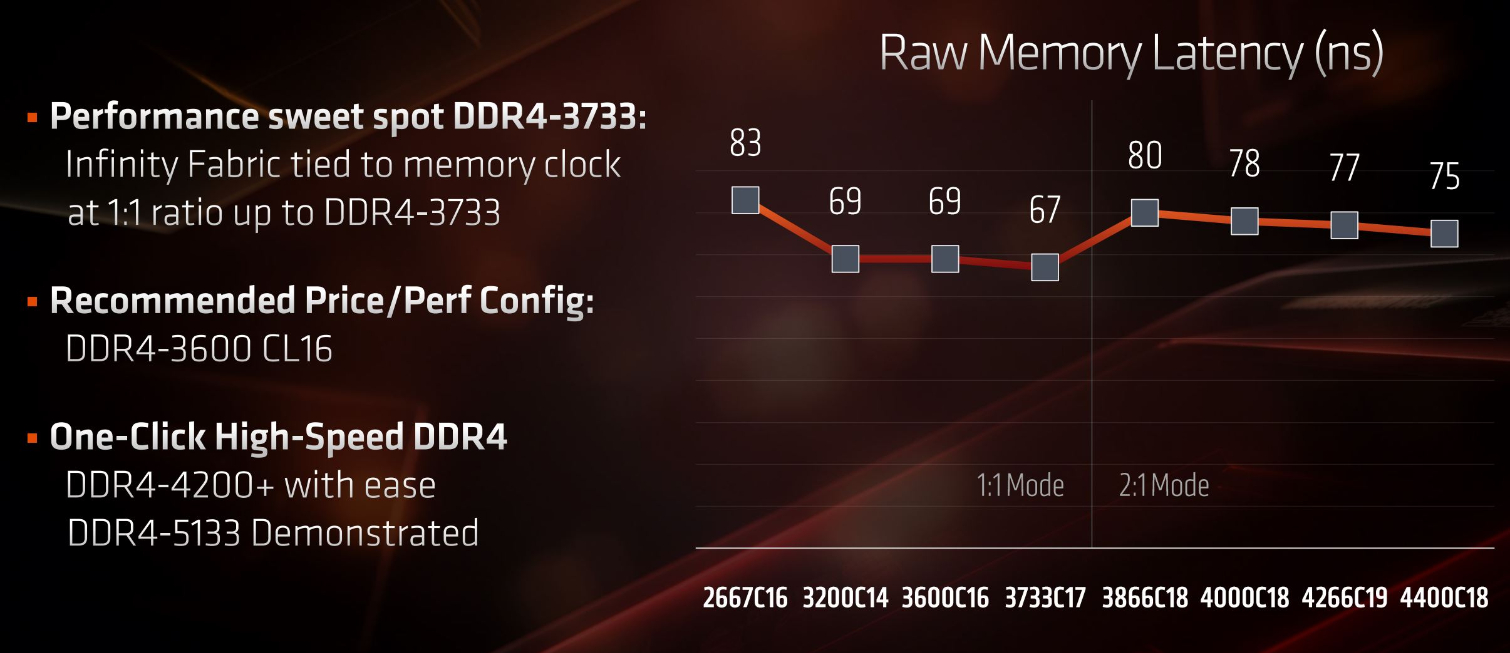
AMD has improved memory overclocking substantially, partly due to decoupling the Infinity Fabric from the memory clock. To sidestep the Infinity Fabric's maximum frequency of 2,000 MHz, which effectively constrains memory overclocking, AMD separated the memory and Infinity Fabric clock dependencies. The domains remain tied together at a 1:1 ratio up to DDR4-3600, but run at a 2:1 ratio beyond that transfer rate. This setting, which is also user-adjustable in the BIOS, improves memory bandwidth but comes with a latency penalty (~9ns). AMD says that the price/performance sweet spot lands at DDR4-3600. As per its usual policy, AMD supports up to 128GB of RAM and enables ECC support, but leaves ECC qualification and enablement to motherboard vendors.
MORE: Best CPUs
MORE: CPU Benchmark Hierarchy
MORE: All CPUs Content
Current page: Cranking it up to 105W
Next Page Boost Clocks, Overclocking, Thermals and Test Setup
Paul Alcorn is the Editor-in-Chief for Tom's Hardware US. He also writes news and reviews on CPUs, storage, and enterprise hardware.
-
Math Geek pretty much what i expected from all the Ryzen 3000 series so far. i am not disappointed at all in what i am seeing.Reply
it does look like the 3700x is the better buy. use that $70 savings for better cooling and you got a winner on your hands it looks like. i personally don't care about a few fps at 1080p when both AMD and Intel hit some nice numbers. 140 fps vs 150 fps is pretty much the same thing to me.
but those extra cores/threads from AMD will go a long way with VM's, production software and the other non-game stuff i do regularly. AMD FTW :geek: -
TJ Hooker In light of the 3700X, the 3800X doesn't seem to have much reason to exist to be honest. Not unless boost/OC behavior somehow changes significantly in the future.Reply -
nitrium Given you can get just about the same performance by OCing a 3700X (and the 3800X doesn't OC really at all), I don't really see why AMD even released this chip - especially considering how much more they are asking for it. The value just isn't there.Reply -
mattkiss What command rate are you running your memory kits at? Also, is the memory write speed nerfed like it is on the 3700X?Reply -
JamesSneed Im curious why the 3700x with PBO is pulling considerably more wattage versus the 3800x with PBO. Is binning really making that large of a difference?Reply -
JamesSneed Replynitrium said:Given you can get just about the same performance by OCing a 3700X (and the 3800X doesn't OC really at all), I don't really see why AMD even released this chip - especially considering how much more they are asking for it. The value just isn't there.
If you are going to OC then I mostly agree however the binning looks like it impacts power draw a lot. However you are not guaranteed 3800x performance out of a 3700x. If you do not intend to OC then there are many valid reasons for the 3800x. The 3800x makes a good case for non overclockers especially because it pulls less power than the stock 3700x. However for me I would much rather they had one more tier like a 3850x that was say 4-4.1Ghz base and 4.8 to 4.9 Ghz boost. A higher binned version I would step up for over the 3700x. -
xcomp666 I was waiting for a decent review.Reply
My conclusion:
I am not planning to OC ( I am using an Asrock Fatal1ty B450 Gaming-ITX ) with 105W TDP, I don't think my motherboard's VRM can handle properly ;:coldsweat:
Performance It is just about ~2% over 3700x that has TDP of 65W ;:mad:
PBO is not hitting 4.4 GHz easily ( depends on silicon lottery);:ouimaitre:
70 USD (92 CAD ) over 3700X;
Single Core performance is not that great;So, I am going to buy a Rysen 7 3700X
🤘 -
TJ Hooker Reply
From what I can find that applies to all Ryzen 3K chips with a single compute die, in which case yes it'd be the same for the 3800X.Makaveli said:Does the 3800x have the same memory write limitation as the 3700x
32b vs 16b ?? -
jclaine I just did a 3700x Asrock x470 itx build. I imagine that I will need to use the wifi on it at some point in it's life, that's why I went with the x470 (Intel (1733) ) version over the b450 (Intel 3168 (433) ). I really didn't want a chipset fan because in 8 years I don't want to have to think about that failing in an old abused system, so I passed on x570.Reply
http://www.mustnotsleepgames.com/Comp/A1%2001.jpg